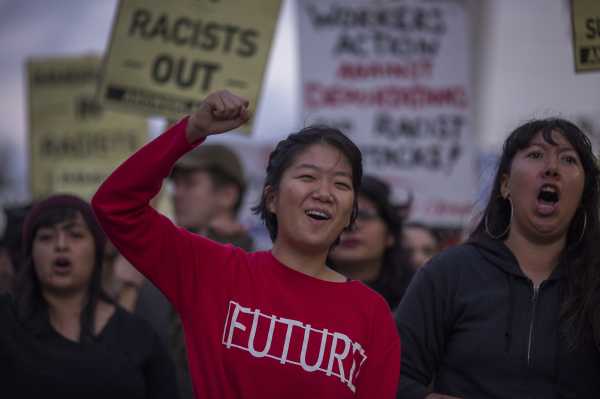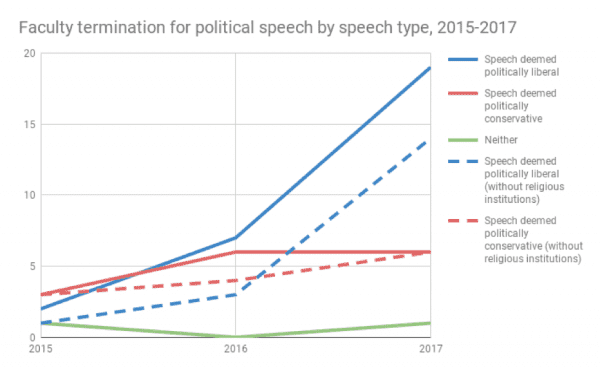
The American college campus, we are led to believe, is a dangerous place: If you say what you really think, particularly as a conservative, a mob of young social justice warriors will come for your faculty position or invitation to speak on campus. Entire books and online magazines are premised on the idea that political correctness is sweeping the American university, threatening both higher education and the broader right to free speech.
But a brand new data analysis from Georgetown University’s Free Speech Project suggests that this “crisis” is more than a little overblown. There have been relatively few incidents of speech being squelched on college campuses, and there’s in fact limited evidence that conservatives are being unfairly targeted.
The Free Speech Project’s researchers have cataloged more than 90 incidents since 2016 that fit their criteria for a person’s free speech rights being threatened. Of those 90, about two-thirds took place on college campuses. These incidents range from a speaker being disinvited to a faculty member being fired over allegedly offensive comments to a student-run play being canceled over concerns it would offend.
The raw numbers here should already raise questions about the so-called political correctness epidemic. According to the Department of Education, there are 4,583 colleges and universities in the United States (including two- and four-year institutions). The fact that there were roughly only 60 incidents in the past two years suggests that free speech crises are extremely rare events and don’t define university life in the way that critics suggest.
Moreover, there’s a consistent pattern in the data when it comes to conservatives — one that tells a different story than you hear among free speech panickers.
“Most of the incidents where presumptively conservative speech has been interrupted or squelched in the last two or three years seem to involve the same few speakers: Milo Yiannopoulos, Ben Shapiro, Charles Murray, and Ann Coulter ,” Sanford Ungar, the Free Speech Project’s director, writes. “In some instances, they seem to invite, and delight in, disruption.”
What Ungar is suggesting here is that the “campus free speech” crisis is somewhat manufactured. Conservative student groups invite speakers famous for offensive and racially charged speech — all of the above speakers fit that bill — in a deliberate attempt to provoke the campus left. In other words, they’re trolling. When students react by protesting or disrupting the event, the conservatives use it as proof that there’s real intolerance for conservative ideas.
The other key thing that emerges from the Georgetown data, according to Ungar, is that these protests and disruptions don’t just target the right. “Our data also include many incidents, generally less well-publicized, where lower-profile scholars, speakers, or students who could be considered to be on the left have been silenced or shut down,” he writes.
Examples include Princeton professor Keeanga-Yamahtta Taylor’s commencement speech being canceled after receiving death threats for criticizing President Donald Trump and the president of Sonoma State University apologizing for allowing a black student to read a poem critical of police violence at commencement.
There’s little reason, according to Ungar, to conclude from any of this that conservative views are uniquely unwelcome on campus.
“One among many untested concepts,” he writes, “is whether the survey results would be different if conservative student groups, instead of repeatedly inviting campus visitors who have built a brand of disruption, were to sponsor serious intellectual dialogue with thinkers on the right.”
What free speech crisis?
Ungar notes that his data is preliminary and not necessarily a full or representative sample. So we can’t put too much weight on the Georgetown findings. However, it’s strikingly consistent with what other academics and free speech watchdogs have found when they looked into the issue.
Jeffrey Sachs, a political scientist at Canada’s Acadia University, put together a database of all incidents where a professor was dismissed for political speech in the United States between 2015 and 2017. Sachs’s results, published by the left-libertarian Niskanen Center, actually found that left-wing professors were more likely to be dismissed for their speech than conservative ones:

The pro-free speech Foundation for Individual Rights in Education keeps a database of speaker disinvitations from campuses. It finds only a handful of disinvitations — somewhere between 20 and 42 — in every year between 2011 and 2017. The highest single-year spike, from 21 in 2015 to 42 in 2016, is mostly the work of one provocateur launching an intentionally inflammatory college tour.
“11 of the 42 disinvitations were for a single speaker: Breitbart editor and right-wing provocateur Milo Yiannopoulos,” FIRE’s Alex Morey writes. “His controversial ‘Dangerous Faggot Tour’ traveled to colleges across the country this year and seemed to prompt a new report of attempted censorship in some form or another each week.”
That’s not to say that there aren’t disturbing incidents on campuses. Robby Soave, an editor at the libertarian magazine Reason (and a good personal friend of mine), has unearthed some troubling examples of students and faculty tossing free speech ideals to the side.
But I keep coming back to the denominator here: There are well over 4,000 colleges and universities in the United States. And multiple attempts to catalog free speech incidents on campus, from different sources, keep coming up with numbers in the dozens. And of those dozens, a fairly large percentage of the targets are liberals, and a fairly large percentage of the others were conservative speakers who seem to have come to campus with the intent of provoking students.
It’s possible that these few incidents have a broader chilling effect: that no one is willing to advance conservative positions on campus because of Milo Yiannopoulos’s chilly reception during his speaking tour. But the mere existence of conservative campus publications across the country would strongly suggest that isn’t true. Conservative students and faculty have plenty of venues through which they can, and do, speak.
Some campus free speech critics, I suspect, aren’t operating in good faith. For them, the entire debate is a way to attack universities as hopelessly and dangerously liberal — to undermine higher education for nakedly partisan reasons.
Indeed, four Republican-controlled state governments have set up new rules for political speech in public universities in response to concerns about free speech. At least seven other state legislatures are considering doing the same, efforts that the New York Times reports are “funded in part by big-money Republican donors” in a “growing and well-organized campaign that has put academia squarely in the crosshairs of the American right.”
In Wisconsin, the strictest of these states, rules drafted by the state university’s board of regents allow students to be expelled if they are found to have disrupted the speech of other students three times.
Protecting free speech on campus by expelling students for their political activism: just what the First Amendment’s drafters intended.
Sourse: vox.com






